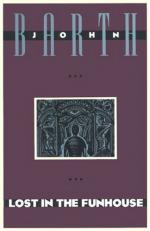|
This section contains 6,662 words (approx. 23 pages at 300 words per page) |

|
SOURCE: "Who Gets Lost in the Funhouse," in Arizona Quarterly, Vol. 44, No. 4, Winter, 1989, pp. 80-97.
In the essay below, Slaughter discusses the subject-object relationship as presented in Lost in the Funhouse from a Cartesian-Kantian perspective, asserting that Barth moves beyond the paralyzing postmodern concern with epistemology to propose narrative as a source of meaning.
Any story, any section of story, will do. This one:
There's no point in going farther; this isn't getting anybody answhere; they haven't even come to the funhouse yet. Ambrose is off the track, in some new or old part of the place that's not supposed to be used; he strayed into it by some one-in-a-million chance, like the time the roller-coaster car left the tracks in the nineteen-teens against all the laws of physics and sailed over the boardwalk in the dark. And they can't locate him because they don't know where to...
|
This section contains 6,662 words (approx. 23 pages at 300 words per page) |

|


